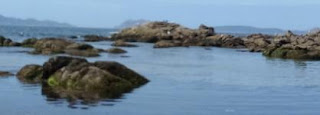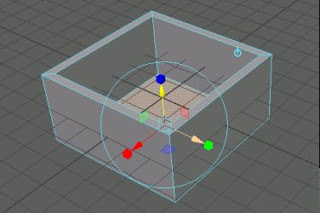Objectives - 3D Water Animation
3D Water
Simulation for animation
Through exploring and contrasting different options
on water simulation that can be applied to an animation project done in Unreal
or Maya.
The objective would be to find a technique that suits
to the animation project, but also build knowledge for future projects.
Intro: personal interest on water
simulation
I've always had certain fascination on the
power of water to transmit emotions: water can transmit calm and
introspection but can also show action, threat, epic and fury, transmitted
through the power of the waves and foam. Or mystery of the creatures and
secrets that are hidden underneath it.
 |
| Calm waters in Samil (Vigo, Spain) |
 |
| Turbulent waters in Howth (Dublin, Ireland) |
I tend to pay attention at the way water and waves are portrayed on paintings and comics. Each artist has a different view of how to express the emotion that the water transmits. For example below we can see the difference between Hugo Pratt's shows a calm, clean and cold water of a river. It contrasts with Herge's drawing, that shows a more lively water with the foam represented by white traces.
The shapes of the waves and foam generate patterns
that are relaxing (or exciting) and hypnotic. There is some mystery on the way
they break down organically. There is a combination of randomness and pattern
that has attracted many scientists to try to de-code it. Famous are the
paintings done by Leonardo trying to understand their patterns.
In the past I have had the opportunity to study the fluid simulation from a technical point of view using CFD Software (Computational Fluid Dynamics) using software such as ANSYS' Fluent.
In this case I want only to scratch the surface on how Maya or Unreal represents it and from a more artistic approach. The objective is to produce a convincing water flow, not building an accurate model for physics studies.
In the past I have had the opportunity to study the fluid simulation from a technical point of view using CFD Software (Computational Fluid Dynamics) using software such as ANSYS' Fluent.
In this case I want only to scratch the surface on how Maya or Unreal represents it and from a more artistic approach. The objective is to produce a convincing water flow, not building an accurate model for physics studies.
Comparison of techniques
Animation Project
Another objective will be trying to I'll try to find a proper animation technique that fits well on the animation project that we are producing: a fairy flying around a town over a canal.There will also be a character that falls into the water, so probably exploring some particle effects for splashing water and small waves.
Methodology
General
approach:
Review /
overview literature of different techniques for water simulation both in Maya
and Unreal
Produce a
document comparing these techniques and defining some parameters to compare
them:
- Difficulty
- Performance
- Accuracy
- Feasibility
- Realism
- Versatility
- …
There are two type of experiments that I have in mind:
Include a simple solid object into a rig of water and see how it interacts
Pouring water in a glass of water, and see how natural it feels.


Comentarios
Publicar un comentario